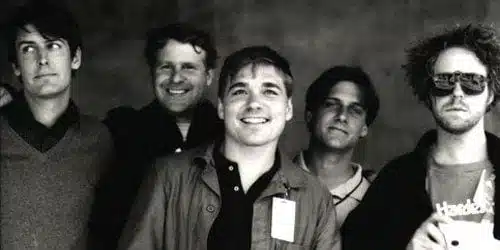
First, some obligatory greatest-hits nitpicking. Where is “Stop Breathin”? Honestly.
As much as it pains me to hear “Summer Babe” displaced from the opening track, kicking off Quarantine the Past with “Gold Soundz” gives a good indication of why Pavement is the kind of band that deserves a best-of collection. The guitars intertwine beautifully, but with a bite and looseness that suggests some punk in their ancestry. Imagine Television, only more concise and maybe a little drunk. Stephen Malkmus’ yelping, offhand vocals are similarly loose, but essentially tuneful, with an unorthodox chorus hook (“We need secrets-crets-crets-crets-crets-crets”) that works better than it seems like it should. The lyrics, while oblique, seem to touch on music’s intricate relationship with memory, with a side helping of self-consciously literary humor (“And they’re coming to the chorus now!”). Academic but not bloodless, enigmatic but approachable, Pavement proved that you could be a punk and a bookworm.
The problem is that today, people likely to care about Pavement already know that. Pavement’s situation seems not unlike the Pixies. Just as the Pixies’ quiet-loud dynamics lost some potency when co-opted by Nirvana and mainstream radio grunge, so too is it hard to fully appreciate Pavement’s achievements now that the lo-fi movement has come and gone and Vampire Weekend have cornered the Ivy League market. Pavement are at least as important for when they made their music as for the music itself. If you weren’t there, it can be a challenge to understand what inspires such religious devotion among the band’s ardent fans.
Unfortunately, Quarantine the Past presents a poor case for the band’s importance. Understand that most of the tracks are excellent. If this were a stand-alone record, I would rate it more highly. As an overview of or introduction to Pavement, it is terribly flawed. Opening quibbles aside, the track list is highly suspect. The first, and most immediately apparent issue upon listening, is that they’ve chosen a surprisingly monochromatic selection. Sure, “Gold Soundz” is great, but all of the songs have the same general feel. Pavement’s surprisingly deft hand at balladry or harder rock is under-represented. Tracks from the early lo-fi EPs help break things up a little, but not enough.
Another issue is the lack of songs from Terror Twilight. With only five albums in the band’s repertoire, you’d think they’d find room for more than one song on a 23-track compilation. In addition to doing disservice to a huge portion of the band’s catalogue, omitting tracks from their last album compounds the diversity problem. Many highlights from Terror Twilight — “Major Leagues”, “You Are a Light”, “Cream of Gold” — show a more restlessly creative side of the band than is on display here.
Lastly, there is “The Unseen Power of the Picket Fence”. It’s a compilation track that finds Malkmus paying affectionate but tongue-in-cheek deadpan tribute to R.E.M. It’s appealingly goofy to converts, I guess, but it comes across as an inside joke that is egregiously out of place on an introduction or overview like this one.
Its presence makes me question the purpose of this record. It only works if you’re intimately familiar with the band already, but if you were, you’d probably already have it, along with everything else here. If you’re not familiar with Pavement, get Slanted and Enchanted and Terror Twilight and assume that the other records fall on a spectrum between those two bookends (or just skip right to Crooked Rain, Crooked Rain). Four of Pavement’s five albums have been reissued with bonus discs containing all contemporaneous tracks, and the last one is coming. These, along with the early EPs anthologized on Westing (By Musket & Sextant), represent the band’s entire recorded output. They’re not daunting, prohibitively expensive, or hard to find. I suppose it’s to the band’s credit that it’s possible to put together a record of such obvious highlights (“Cut Your Hair”, “Stereo”, “In the Mouth a Desert”, etc.) and still have it leave out essential stuff. But in the end, the best introduction to Pavement remains the original albums that people fell in love with in the first place.
Also, seriously, no “Major Leagues”? You’re killing me here.
